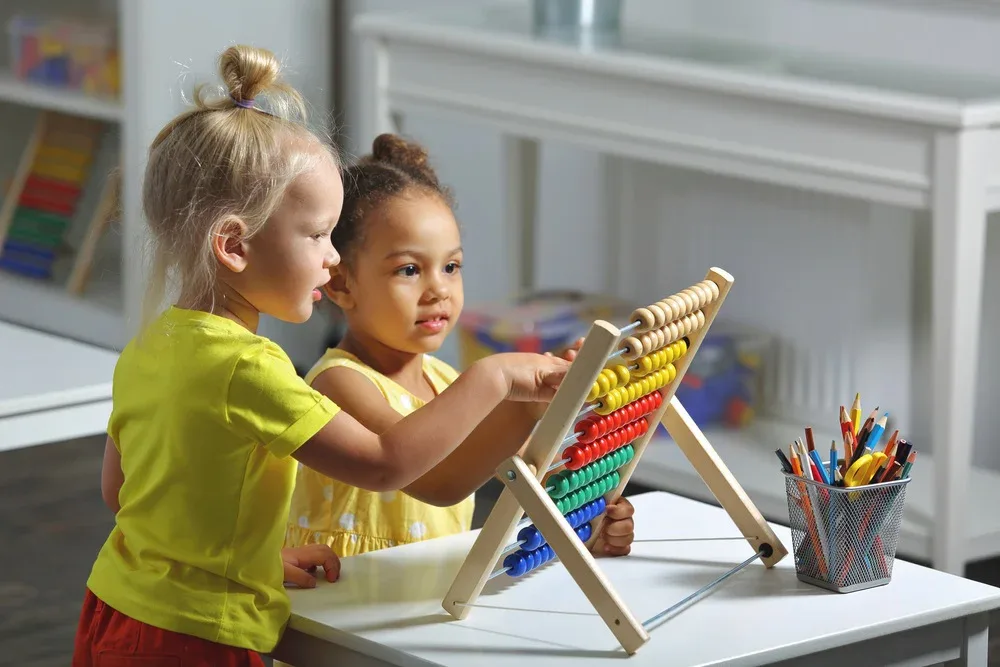Why daycare is good for toddlers? Daycare centers are necessary for working parents and are fundamental to a child’s early development. They provide a structured, nurturing environment where toddlers can make their first friends, learn valuable life skills, and get a head start on the education that will shape their futures. This article delves into the ten significant benefits of daycare for toddlers, highlighting how these early experiences contribute to their emotional, social, intellectual, and physical development. By understanding these benefits, parents can feel more confident about entrusting their child to a daycare program.
Contents
- 1 Socialization with Peers
- 2 Early Learning Experiences
- 3 Development of Communication Skills
- 4 Promotes Independence
- 5 Exposure to Diversity
- 6 Strengthened Immunity
- 7 Better Transition to Kindergarten
- 8 Support for Working Parents
- 9 Physical Activity and Health
- 10 Emotional and Behavioral Benefits
- 11 Why Choose DeeCyDa Daycare for Your Infant?
- 12 FAQ
- 13 Conclusion
Socialization with Peers
The importance of early socialization cannot be overstated. In daycare, toddlers are immersed in a social environment with their peers, crucial for developing interpersonal skills such as sharing, cooperation, and empathy. These settings allow children to form friendships, understand different perspectives, and navigate the complexities of social interactions under the guidance of caring adults. This foundation of social skills is essential for their future relationships. It helps to build a sense of community and belonging from an early age.
Early Learning Experiences
Daycare centers are much more than safe spaces for children while their parents are at work; they are vibrant learning hubs where toddlers are exposed to a wide range of cognitive stimuli. Children learn basic but vital concepts through games, storytelling, and various educational activities that will aid their academic journey. These early learning experiences are designed to spark curiosity and a love for learning, setting the stage for lifelong intellectual growth. Educators in daycare settings are skilled at turning everyday moments into teachable experiences, enriching the children’s understanding of the world around them.
Development of Communication Skills
One of the most significant benefits of daycare is the rapid development of communication skills it fosters in young children. As toddlers interact with their peers and caregivers, they learn to articulate their thoughts, express their needs and feelings, and listen to others. This exchange broadens their vocabulary and enhances their ability to communicate effectively, an essential skill for personal and professional success. Moreover, being in a group setting encourages shy children to come out of their shells and become more confident communicators.
For more in-depth information on developmental milestones and how early childhood education supports them, the American Academy of Pediatrics offers a comprehensive guide. Visit HealthyChildren.org to explore resources that underscore the importance of quality care environments like DeeCyDa Daycare’s Infant Care Program in nurturing young minds and bodies.
Promotes Independence
The structured routine of daycare encourages toddlers to take small steps towards independence. Simple daily tasks, such as organizing their belongings, following a schedule for meals and playtime, and taking responsibility for personal hygiene, teach children self-sufficiency. These activities, although small, play a significant role in building a child’s confidence in their abilities. Managing these tasks without constant parental intervention helps children develop a sense of autonomy and pride in their accomplishments.
Exposure to Diversity
Daycare offers children the invaluable opportunity to meet and learn from people of different cultures, languages, and family backgrounds. This early exposure to diversity teaches children the importance of inclusivity and respect for others, regardless of their differences. It broadens their understanding of the world, fostering an open-mindedness crucial in today’s global society. Such an environment helps children appreciate diversity from a young age, promoting harmony and understanding among future generations.
Strengthened Immunity
While parents may initially worry about their child getting sick more often in daycare, there is a silver lining. Regular exposure to common colds and viruses can strengthen a child’s immune system. This natural process of building immunity helps prepare toddlers for more robust health in later childhood and adulthood. Although daycares need to maintain high standards of cleanliness and hygiene, the minor illnesses children may encounter are part of developing a stronger immune defense against more significant diseases.
Better Transition to Kindergarten
Children who attend daycare tend to experience a smoother transition to kindergarten. This is because daycare mimics many aspects of a formal education environment, including structured schedules, group activities, and basic academic concepts. This familiarity reduces anxiety and adjustment issues when children start school. Moreover, the social and cognitive skills developed in daycare contribute to a child’s readiness for more formal learning settings, giving them a head start in their educational journey.
Support for Working Parents
For working parents, daycare is an indispensable support system that provides their children with a reliable, safe, and enriching environment. Knowing that their child is being cared for by professionals dedicated to their well-being allows parents to focus on their work commitments without undue stress. This peace of mind is invaluable, as it supports the overall well-being of the family unit. Additionally, many daycare centers offer extended hours and flexible schedules to accommodate the diverse needs of working families.
Physical Activity and Health
Physical activity is a cornerstone of healthy development, and daycare centers provide ample opportunities for children to exercise through play. Structured physical activities, outdoor play, and movement games are:
- Part of the daily routine.
- Supporting the development of motor skills.
- Coordination.
- Overall physical health.
Regular, active playtime promotes physical well-being, contributes to better sleep patterns, and helps manage energy levels throughout the day.
Emotional and Behavioral Benefits
The routine and structure provided by daycare create a stable environment that fosters emotional security and well-being. This framework teaches children to manage feelings, develop patience, and interact positively with others. This setting also teaches resilience as children navigate challenges and learn to adapt to new situations. The social norms and expectations encountered in daycare help develop self-regulation skills and positive behavior, laying the groundwork for emotional intelligence and social competence.
Why Choose DeeCyDa Daycare for Your Infant?
Choose DeeCyDa Daycare for your infant because we offer a safe, nurturing environment with experienced staff dedicated to your child’s development. With personalized care, stimulating activities, and open communication with parents, we ensure your infant thrives in our care. Trust DeeCyDa Daycare for your child’s healthy growth and well-being.
Personalized Care
We believe every child is unique. Our low child-to-caregiver ratio ensures personalized attention to meet your infant’s needs, fostering emotional security and developmental growth.
Early Learning Foundations
Our program is tailored to stimulate your child’s cognitive, emotional, and physical development through playful, age-appropriate activities. We’re committed to making learning fun and impactful.
Safe and Nurturing Environment
Your child’s safety is our top priority. Our facilities are secure, clean, and designed with infants in mind, providing a cozy space for your child to learn and play.
Experienced Caregivers
Our team of professionals is passionate about early childhood education and dedicated to creating a warm, supportive atmosphere where your child can thrive.
FAQ
What Age Is Best for a Child to Start Daycare?
While the best age for a child to start daycare can vary greatly depending on individual circumstances and developmental readiness, many experts suggest that children benefit most from socialization and structured learning environments between one and three years of age. Starting daycare during this formative period can maximize the benefits of early socialization, learning experiences, and developmental support provided by these programs.
Is Daycare Safe for Infants and Toddlers?
Daycare is generally safe for infants and toddlers, provided that the facility adheres to high standards of care, safety, and hygiene. It is essential for parents to thoroughly research and select a daycare that is licensed and has a positive reputation for maintaining a clean, secure, and nurturing environment. Key factors to consider include staff-to-child ratios, qualifications of the caregivers, cleanliness of the facility, and the implementation of safety protocols.
How Does Daycare Affect a Child's Development?
Daycare positively impacts a child’s development in multiple ways. It fosters social skills, promotes early learning, enhances communication, encourages independence, and exposes children to diverse cultures and ideas. Additionally, daycare environments help to strengthen children’s immune systems, prepare them for a smoother transition to formal schooling, support physical health through active play, and contribute to their emotional and behavioral development. These benefits collectively support a well-rounded early childhood development
that lays a solid foundation for future success.
What Are the Social Benefits of Daycare for Young Children?
Daycare offers significant social benefits for young children, providing them with early opportunities to engage with peers and develop important social skills. In a daycare setting, children learn to share, cooperate, and interact respectfully with others, which are crucial components of social development. Exposure to a variety of social situations helps children to build confidence, empathy, and adaptability.
Can Daycare Help in a Child's Future Academic Success?
Daycare can be crucial in laying the groundwork for a child’s future academic success. The early learning experiences provided by daycare stimulate cognitive development, curiosity, and a love for learning. By introducing children to basic academic concepts and social skills in a structured yet playful environment, daycare helps to prepare children for the academic challenges of formal schooling. This early advantage can lead to better educational outcomes and a positive attitude toward learning that persists throughout a child’s life
Conclusion
in daycare can have profound and lasting benefits for their development. From enhancing social skills and communication to promoting independence and academic readiness, daycare’s advantages contribute to children’s holistic growth. These early experiences support working families and play a crucial role in preparing the next generation for the challenges and opportunities ahead. Parents can ensure their children have the best possible start in life by choosing the right daycare environment, paving the way for a future filled with success and happiness.
At DeeCyDa Daycare, we understand the importance of the early years in shaping your child’s future. Our Infant Care Program is designed with love, care, and a deep understanding of what young learners need to thrive. From nurturing their first steps to fostering early communication skills, we provide a safe, welcoming, and enriching environment for your little ones to grow and explore through daycare activities for toddlers. Looking for a daycare in Irvine? Contact us today to learn more about our Infant Care Program and schedule a visit to DeeCyDa Daycare.


